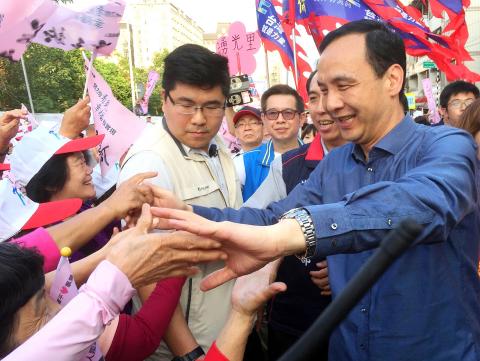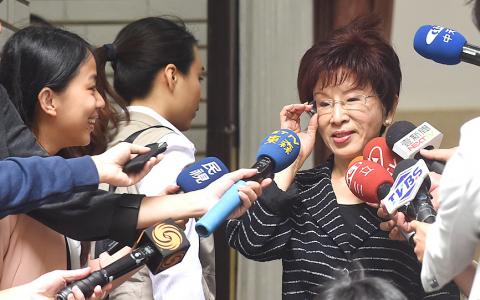Several Chinese Nationalist Party (KMT) members yesterday ridiculed the party’s list of legislator-at-large nominees, which critics described as the worst lineup in history.
Prior to a meeting of the KMT’s Central Standing Committee yesterday afternoon, committee member Yao Chiang-lin (姚江臨) told reporters that while he dared not criticize the list as the worst in history, its rankings were undeniably unfair to grassroots workers.
“The Social Democratic Party gave its labor representative the top spot on its legislator-at-large list, while the Democratic Progressive Party put its in 14th place. However, the KMT placed Taiwan Confederation of Trade Unions director-general Chuang Chueh-an (莊爵安) 19th,” Yao said.

Photo: CNA
Yao said workers and farmers were the reasons the KMT was defeated by the Chinese Communist Party in the Chinese Civil War, forcing it out of China in 1949, and why it lost the 2000 presidential election.
The KMT has not learned its lesson and still disregards grassroots workers, Yao said, adding that the list included too many unfamiliar names and too few people who have made contributions to the party.
Central Standing Committee member Hou Tsai-feng (侯彩鳳) gave the list a score of 60 percent, saying that although the KMT leadership moved Chuang from 22nd spot to 19th, he was still excluded from the “safe list.”

Photo: Liu Hsin-de, Taipei Times
“If the nominees were selected for the purpose of boosting the KMT’s election prospects in the 2018 mayoral and county commissioner elections, then why are so many of them not running for a regional seat in the legislature?” Hou said, referring to Chu’s plan to recruit candidates from the list for the local elections in 2018 after they have accumulated experience during the first two years of their four-year legislative term.
“I beg of you, higher echelons of the KMT: Please give the party a break,” Hou added.
Committee member Tseng Wen-pei (曾文培) said the KMT leadership should explain its criteria for choosing the nominees, as many of them might serve as the party’s “small Cabinet” in the legislature should it lose power next year.
“The KMT’s 211-seat Central Standing Committee is to vote on each of the nominees tomorrow [today]. No one has ever been removed from the list by the committee, but I am not so sure about that this time,” Tseng said.
According to KMT regulations, nominees who receive votes of disapproval from more than half of the committee members attending a meeting would see their nomination annulled.
The KMT’s Huang Fu-hsing (黃復興) military veterans’ branch issued a press release yesterday saying it regrets the party’s decision to place Legislative Speaker Wang Jin-pyng (王金平) at the top of the list.
“While the decision was made out of respect for the speaker and due to some political considerations, it nevertheless failed people’s expectation for fundamental reform of the legislature,” it said.
Legislative Deputy Speaker Hung Hsiu-chu (洪秀柱) gave a score of 100 when asked by reporters to grade the legislator-at-large list.
Asked if she was serious, Hung said: “Who still means what they say nowadays?”
Lee Kuang-yi (李光儀), a journalist with the Chinese-language United Daily Evening News, traditionally a pan-blue-leaning newspaper, called the list the “lamest ever in history.”
“There is nothing refreshing or new, only traces of wrangling between different KMT factions and pork-barrel politics. I believe no pan-blue supporter would be happy with the list,” Lee said in an editorial on Thursday.

AIR SUPPORT: The Ministry of National Defense thanked the US for the delivery, adding that it was an indicator of the White House’s commitment to the Taiwan Relations Act Deputy Minister of National Defense Po Horng-huei (柏鴻輝) and Representative to the US Alexander Yui on Friday attended a delivery ceremony for the first of Taiwan’s long-awaited 66 F-16C/D Block 70 jets at a Lockheed Martin Corp factory in Greenville, South Carolina. “We are so proud to be the global home of the F-16 and to support Taiwan’s air defense capabilities,” US Representative William Timmons wrote on X, alongside a photograph of Taiwanese and US officials at the event. The F-16C/D Block 70 jets Taiwan ordered have the same capabilities as aircraft that had been upgraded to F-16Vs. The batch of Lockheed Martin

GRIDLOCK: The National Fire Agency’s Special Search and Rescue team is on standby to travel to the countries to help out with the rescue effort A powerful earthquake rocked Myanmar and neighboring Thailand yesterday, killing at least three people in Bangkok and burying dozens when a high-rise building under construction collapsed. Footage shared on social media from Myanmar’s second-largest city showed widespread destruction, raising fears that many were trapped under the rubble or killed. The magnitude 7.7 earthquake, with an epicenter near Mandalay in Myanmar, struck at midday and was followed by a strong magnitude 6.4 aftershock. The extent of death, injury and destruction — especially in Myanmar, which is embroiled in a civil war and where information is tightly controlled at the best of times —

Taiwan was ranked the fourth-safest country in the world with a score of 82.9, trailing only Andorra, the United Arab Emirates and Qatar in Numbeo’s Safety Index by Country report. Taiwan’s score improved by 0.1 points compared with last year’s mid-year report, which had Taiwan fourth with a score of 82.8. However, both scores were lower than in last year’s first review, when Taiwan scored 83.3, and are a long way from when Taiwan was named the second-safest country in the world in 2021, scoring 84.8. Taiwan ranked higher than Singapore in ninth with a score of 77.4 and Japan in 10th with

SECURITY RISK: If there is a conflict between China and Taiwan, ‘there would likely be significant consequences to global economic and security interests,’ it said China remains the top military and cyber threat to the US and continues to make progress on capabilities to seize Taiwan, a report by US intelligence agencies said on Tuesday. The report provides an overview of the “collective insights” of top US intelligence agencies about the security threats to the US posed by foreign nations and criminal organizations. In its Annual Threat Assessment, the agencies divided threats facing the US into two broad categories, “nonstate transnational criminals and terrorists” and “major state actors,” with China, Russia, Iran and North Korea named. Of those countries, “China presents the most comprehensive and robust military threat